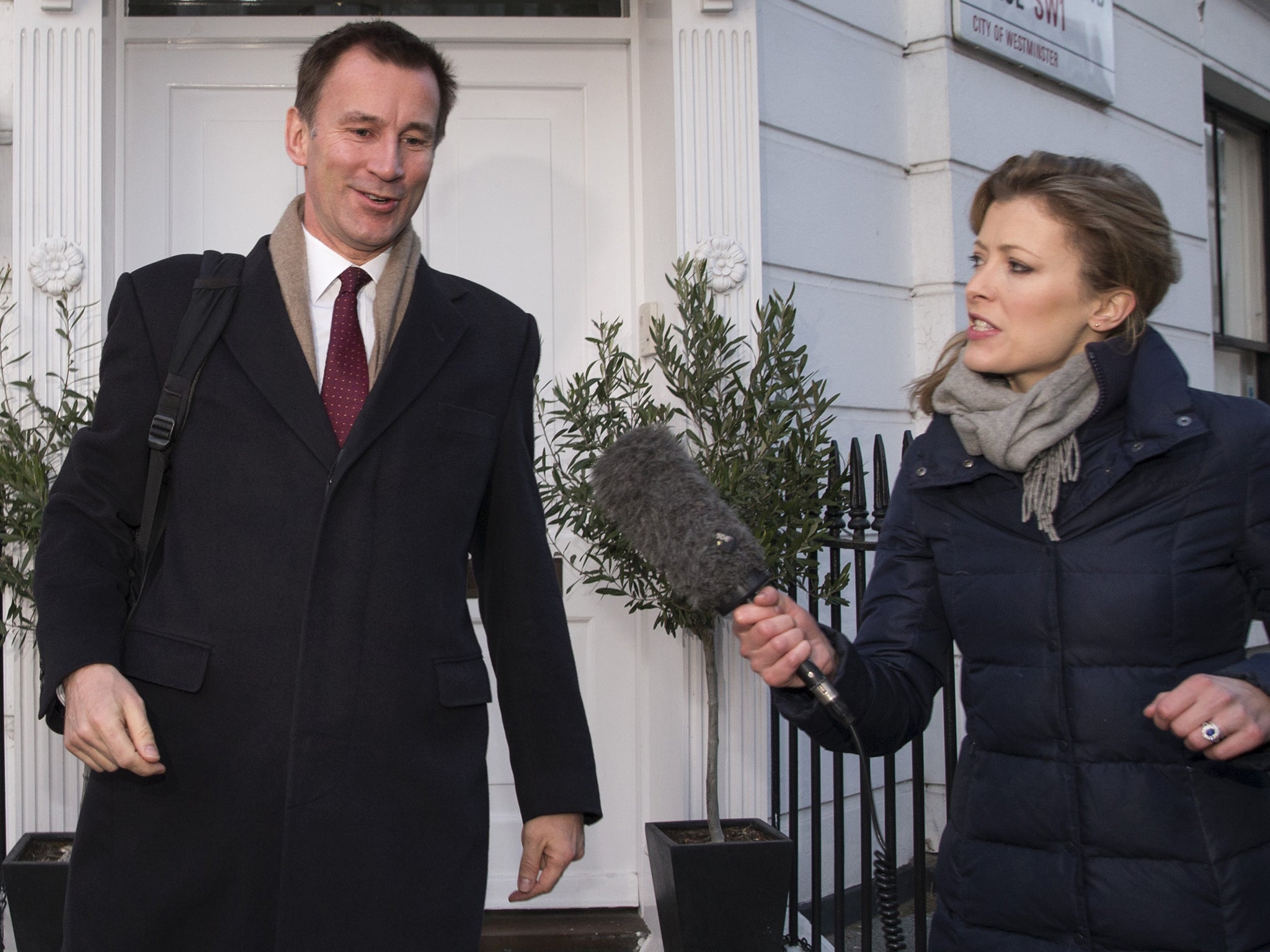Imposing the new junior doctors' contract could cost Jeremy Hunt dear
Inside Westminster: Mr Hunt has made the mistake of forgetting people trust doctors a lot more than they do politicians


Labour’s unpublished research after last year’s election found one reason for its defeat was that “Tory negatives” had receded. “Fears about Tories on the NHS have largely (but not totally) subsided,” its report said. “Some [voters] feel that the Tories have insulated themselves with reassurances…starting the process effectively by challenging medics on weekend working.”
Today the Conservatives’ manifesto pledge for a “seven-day NHS” does not look quite so clever. The decision by Jeremy Hunt to impose a new contract for junior doctors in England may bring seven-day working a step closer, but at a very high price for the Health Secretary. The anger of the doctors is real. Perhaps tempers will cool a little when they read their contract in full. But if there are more strikes, it is by no means certain that Mr Hunt will escape the blame; the public support the doctors by a margin of 2-1. If doctors move to Australia, Scotland or Wales in great numbers, it will be very difficult to provide the staffing cover the new contract was designed to ensure, and the buck will stop with the Health Secretary.
He has alienated the doctors by fighting dirty: wrongly implying they did not already work at weekends; questioning their “sense of vocation and professionalism”; accusing them of militancy when they had so obviously been provoked and using dodgy statistics about weekend death rates. Patients admitted to hospital on a Saturday or Sunday are more likely be seriously ill than those admitted on a weekday. Independent experts say the figures do not prove that extra staffing would necessarily save lives.

When Mr Hunt imposed the new contract after the junior doctors’ second one-day strike on Wednesday, his chief negotiator claimed support from the bosses of 20 NHS trusts. On Friday it emerged that 10 of them do not back imposition, saying only that the deal was reasonable (and, to be fair, it does include some improvements on the Government’s original offers).
Mr Hunt was not supposed to be the bogeyman. His role was as Mr Nice – for NHS staff as well as patients—after his predecessor Andrew Lansley embarked on a pointless NHS reorganisation instead of tackling the issue our politicians have dodged since the 1960s – the need to merge health and social care.
Until his bitter dispute with the British Medical Association, Mr Hunt was an effective patients’ champion. His calm bedside manner, plus David Cameron’s reassuring words and family’s experience of using the NHS, helped the Tories regain public confidence on an issue which was traditionally Labour’s strongest suit.
Mr Hunt’s mistake was to forget that people trust doctors a lot more than they do politicians. He should have remembered what happened to Michael Gove. The reforms he made as Education Secretary are driving up standards but his abrasive manner alienated teachers and, in turn, parents. To his surprise, his friend and fellow moderniser Mr Cameron ousted him from the Department for Education in 2014 after the Tories’ election strategist Sir Lynton Crosby warned that Mr Gove had become toxic. He was replaced by the emollient Nicky Morgan, who has rebuilt bridges with the teachers. Perhaps Mr Hunt will suffer the same fate when Mr Cameron reshuffles his Cabinet after the EU referendum expected in June.
Although Downing Street insiders insist he still has Mr Cameron’s full backing, I detect alarm bells over Mr Hunt’s handling of the doctors’ dispute. The Prime Minister knows that trust is hard won and easily lost. He does not want to see the Tory brand retoxified on such a symbolic issue as health, just as he races racing against time to complete the detox with his “all-out assault on poverty”; a drive to increase social mobility and even liberal prison reforms.
The Government will have enough problems finding the money for the already overstretched NHS by the 2020 election. It is obvious it will need more than the extra £8bn a year allocated, and that the £22bn of planned efficiency savings will very hard to achieve, even under the impressive Simon Stevens, chief executive of NHS England. Some Conservatives worry that their party may be a casualty of the war with the BMA, even if Mr Hunt’s headline victory sets a precedent for weekend working by other NHS professionals such as consultants and nurses. One Tory MP put it: “The BMA was never going to accept whatever was on the table, but our handling of it has been a disaster. It could turn the rest of the NHS and then the public against us. We would be back to square one.”
One lesson from this sorry saga is that politicians should keep out of detailed negotiations on pay and conditions. Of course they have to set the financial framework, but the detail should be left to managers and unions. Ministers often promise to end “command and control” and to devolve power to public service managers, but rarely do.
The wider lesson is that the NHS is such a precious institution that we need to take the politics out while we put the extra money in. That is why four former health ministers from three parties- Norman Fowler, Stephen Dorrell, Alan Milburn and Norman Lamb—have suggested a cross-party or royal commission on the looming funding crisis, which means integrating health and social care. The problem is that one of the big two parties will always sense an advantage at the next election. We need a cross-party blueprint for saving the NHS, but we won’t get one.
Join our commenting forum
Join thought-provoking conversations, follow other Independent readers and see their replies
Comments
Bookmark popover
Removed from bookmarks